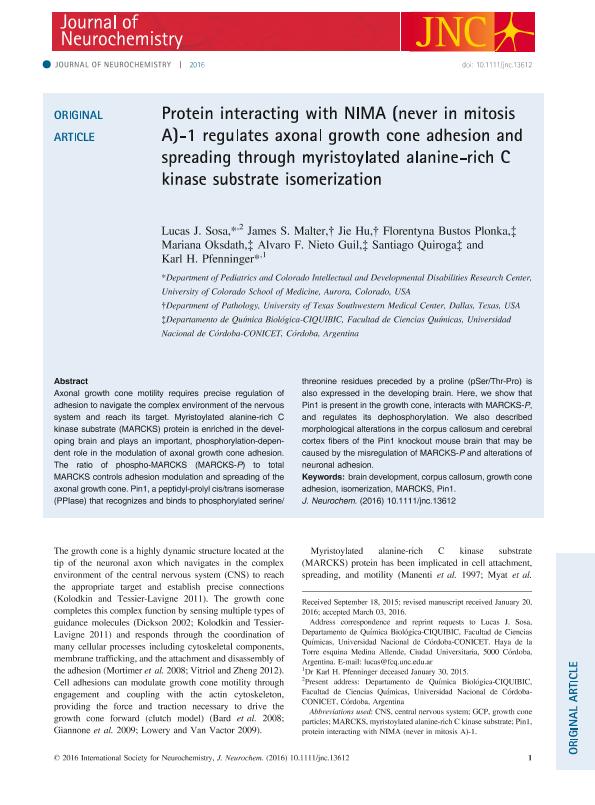Mostrar el registro sencillo del ítem
dc.contributor.author
Sosa, Lucas Javier

dc.contributor.author
Malter, James S.
dc.contributor.author
Hu, Jie
dc.contributor.author
Bustos Plonka, Florentina
dc.contributor.author
Oksdath Mansilla, Mariana

dc.contributor.author
Nieto Guil, Alvaro Fernando

dc.contributor.author
Quiroga, Santiago

dc.contributor.author
Pfenninger, Karl H.
dc.date.available
2018-07-02T17:22:07Z
dc.date.issued
2016-06
dc.identifier.citation
Sosa, Lucas Javier; Malter, James S.; Hu, Jie; Bustos Plonka, Florentina; Oksdath Mansilla, Mariana; et al.; Protein interacting with NIMA (never in mitosis A)-1 regulates axonal growth cone adhesion and spreading through myristoylated alanine-rich C kinase substrate isomerization; Wiley Blackwell Publishing, Inc; Journal of Neurochemistry; 137; 5; 6-2016; 744-755
dc.identifier.issn
0022-3042
dc.identifier.uri
http://hdl.handle.net/11336/50851
dc.description.abstract
Axonal growth cone motility requires precise regulation of adhesion to navigate the complex environment of the nervous system and reach its target. Myristoylated alanine-rich C kinase substrate (MARCKS) protein is enriched in the developing brain and plays an important, phosphorylation-dependent role in the modulation of axonal growth cone adhesion. The ratio of phospho-MARCKS (MARCKS-P) to total MARCKS controls adhesion modulation and spreading of the axonal growth cone. Pin1, a peptidyl-prolyl cis/trans isomerase (PPIase) that recognizes and binds to phosphorylated serine/threonine residues preceded by a proline (pSer/Thr-Pro) is also expressed in the developing brain. Here, we show that Pin1 is present in the growth cone, interacts with MARCKS-P, and regulates its dephosphorylation. We also described morphological alterations in the corpus callosum and cerebral cortex fibers of the Pin1 knockout mouse brain that may be caused by the misregulation of MARCKS-P and alterations of neuronal adhesion. We have shown that MARCKS, a critical protein in the movement of neuronal growth cones, is in turn regulated by both phosphorylation and cis-trans peptidyl isomerization mediated by Pin1. In the absence of Pin1, MARCKS is hyperphosphorylated, leading to loss of adhesions, and collapse of the growth cone. The Pin1 KO mice exhibited disturbed neuronal projections from the cerebral cortex and reduced white matter tracks such as the corpus callosum. This study highlights a novel function of Pin1 in neurodevelopment. We have shown that MARCKS, a critical protein in the movement of neuronal growth cones, is in turn regulated by both phosphorylation and cis-trans peptidyl isomerization mediated by Pin1. In the absence of Pin1, MARCKS is hyperphosphorylated, leading to loss of adhesions, and collapse of the growth cone. The Pin1 KO mice exhibited disturbed neuronal projections from the cerebral cortex and reduced white matter tracks such as the corpus callosum. This study highlights a novel function of Pin1 in neurodevelopment.
dc.format
application/pdf
dc.language.iso
eng
dc.publisher
Wiley Blackwell Publishing, Inc

dc.rights
info:eu-repo/semantics/openAccess
dc.rights.uri
https://creativecommons.org/licenses/by-nc-sa/2.5/ar/
dc.subject
BRAIN DEVELOPMENT
dc.subject
CORPUS CALLOSUM
dc.subject
GROWTH CONE ADHESION
dc.subject
ISOMERIZATION
dc.subject
MARCKS
dc.subject
PIN1
dc.subject.classification
Otras Ciencias Biológicas

dc.subject.classification
Ciencias Biológicas

dc.subject.classification
CIENCIAS NATURALES Y EXACTAS

dc.title
Protein interacting with NIMA (never in mitosis A)-1 regulates axonal growth cone adhesion and spreading through myristoylated alanine-rich C kinase substrate isomerization
dc.type
info:eu-repo/semantics/article
dc.type
info:ar-repo/semantics/artículo
dc.type
info:eu-repo/semantics/publishedVersion
dc.date.updated
2018-06-29T16:44:49Z
dc.identifier.eissn
1471-4159
dc.journal.volume
137
dc.journal.number
5
dc.journal.pagination
744-755
dc.journal.pais
Reino Unido

dc.journal.ciudad
Londres
dc.description.fil
Fil: Sosa, Lucas Javier. Consejo Nacional de Investigaciones Científicas y Técnicas. Centro Científico Tecnológico Conicet - Córdoba. Centro de Investigaciones en Química Biológica de Córdoba. Universidad Nacional de Córdoba. Facultad de Ciencias Químicas. Centro de Investigaciones en Química Biológica de Córdoba; Argentina
dc.description.fil
Fil: Malter, James S.. University of Texas. Southwestern Medical Center; Estados Unidos
dc.description.fil
Fil: Hu, Jie. University of Texas. Southwestern Medical Center; Estados Unidos
dc.description.fil
Fil: Bustos Plonka, Florentina. Consejo Nacional de Investigaciones Científicas y Técnicas. Centro Científico Tecnológico Conicet - Córdoba. Centro de Investigaciones en Química Biológica de Córdoba. Universidad Nacional de Córdoba. Facultad de Ciencias Químicas. Centro de Investigaciones en Química Biológica de Córdoba; Argentina
dc.description.fil
Fil: Oksdath Mansilla, Mariana. Consejo Nacional de Investigaciones Científicas y Técnicas. Centro Científico Tecnológico Conicet - Córdoba. Centro de Investigaciones en Química Biológica de Córdoba. Universidad Nacional de Córdoba. Facultad de Ciencias Químicas. Centro de Investigaciones en Química Biológica de Córdoba; Argentina
dc.description.fil
Fil: Nieto Guil, Alvaro Fernando. Consejo Nacional de Investigaciones Científicas y Técnicas. Centro Científico Tecnológico Conicet - Córdoba. Centro de Investigaciones en Química Biológica de Córdoba. Universidad Nacional de Córdoba. Facultad de Ciencias Químicas. Centro de Investigaciones en Química Biológica de Córdoba; Argentina
dc.description.fil
Fil: Quiroga, Santiago. Consejo Nacional de Investigaciones Científicas y Técnicas. Centro Científico Tecnológico Conicet - Córdoba. Centro de Investigaciones en Química Biológica de Córdoba. Universidad Nacional de Córdoba. Facultad de Ciencias Químicas. Centro de Investigaciones en Química Biológica de Córdoba; Argentina
dc.description.fil
Fil: Pfenninger, Karl H.. University of Colorado. School of Medicine. Research Center. Department of Pediatrics and Colorado Intellectual and Developmental Disabilities; Estados Unidos
dc.journal.title
Journal of Neurochemistry

dc.relation.alternativeid
info:eu-repo/semantics/altIdentifier/url/https://onlinelibrary.wiley.com/doi/abs/10.1111/jnc.13612
dc.relation.alternativeid
info:eu-repo/semantics/altIdentifier/doi/https://dx.doi.org/10.1111/jnc.13612
Archivos asociados
